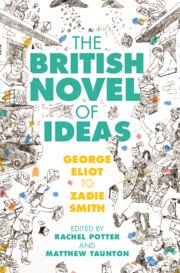Book contents
- The British Novel of Ideas
- The British Novel of Ideas
- Copyright page
- Contents
- Contributors
- Dedication
- Introduction The British Novel of Ideas
- Part I 1850–1900
- Part II 1900–1945
- Chapter 5 The British Novel of Ideas in an International Context
- Chapter 6 H. G. Wells
- Chapter 7 G. K. Chesterton
- Chapter 8 E. M. Forster
- Chapter 9 Aldous Huxley
- Chapter 10 Katharine Burdekin
- Chapter 11 Mulk Raj Anand
- Chapter 12 Storm Jameson
- Part III 1945–1975
- Part IV 1975–Present
- Bibliography
- Index
Chapter 5 - The British Novel of Ideas in an International Context
from Part II - 1900–1945
Published online by Cambridge University Press: 05 December 2024
- The British Novel of Ideas
- The British Novel of Ideas
- Copyright page
- Contents
- Contributors
- Dedication
- Introduction The British Novel of Ideas
- Part I 1850–1900
- Part II 1900–1945
- Chapter 5 The British Novel of Ideas in an International Context
- Chapter 6 H. G. Wells
- Chapter 7 G. K. Chesterton
- Chapter 8 E. M. Forster
- Chapter 9 Aldous Huxley
- Chapter 10 Katharine Burdekin
- Chapter 11 Mulk Raj Anand
- Chapter 12 Storm Jameson
- Part III 1945–1975
- Part IV 1975–Present
- Bibliography
- Index
Summary
The novel of ideas was rejected by British-based modernist writers. In the international literary sphere there was less hostility to the fictional representation of philosophical, political and religious ideas, and there was also significant critical discussion of literature as a specific kind of speculative thinking. Outside Britain the representation of ideas and the formal experimentations of the modern novel were not seen as being in conflict with one another. Writers at the forefront of developments in the novel, including Fyodor Dostoevsky, André Gide, Thomas Mann, Rabindranath Tagore and Jean-Paul Sartre were both formally experimental and engaged with the novelistic implications of philosophical, religious or political thought. In this chapter I consider two kinds of modern novels of ideas, the ironic and the dialogistic. I focus on the writing of John Galsworthy in relation to Thomas Mann’s ironic Buddenbrooks and Graham Greene’s The Power and the Glory in relation to André Malraux’s dialogistic La Condition Humaine.
Keywords
- Type
- Chapter
- Information
- The British Novel of IdeasGeorge Eliot to Zadie Smith, pp. 99 - 119Publisher: Cambridge University PressPrint publication year: 2024

